- Home
- Michael Wallace
The Dark Citadel Page 2
The Dark Citadel Read online
Page 2
The Nendra manor sat quietly for three weeks after the money counters left father’s employ; father could no longer pay them. Servants slipped away during the night, or begged release to visit a sick relative or take care of other pressing business. Father railed against their faithlessness but was powerless to stop them. The slaves and a handful of loyal servants remained behind, together with Darik, his sister Kaya, and Kaya’s nursemaid.
Darik woke one night to an insistent pounding on his chamber door. He pushed aside pillows that had built up over his head while he slept, pressing in with a smothering heat. Still groggy, he opened the door and blinked at what he saw.
A man stood in the hallway, wearing thick purple robes, clasped with a broach with a giant emerald that stared at him like a green eye. A silk turban sat on his head and rings sat on every finger, so big and heavy that they made his hands look like claws.
“Come with me slave,” the man said sharply. “Hurry, boy.”
“I’m not a slave,” Darik said, heat rising in his cheeks at such insolence. “And who are you? Where are the guards?”
The man laughed without fear and Darik blinked, suddenly recognizing the man. Father had pointed him out at every feast, complained about him too many times to forget. Fenerath, the guildmaster, and father’s enemy. Fenerath was young for a guildmaster, several years younger than father, with a lean, cunning look in his eyes.
The man standing to the right of the guildmaster wore the blue turban of a Selphan and held scrolls of disbursement in his hand, closed with the grand vizier’s seal. The grand vizier had given similar scrolls to father when he’d brought judgment before the guild courts against a business partner who’d cheated father during a trading mission to Eriscoba. All of the man’s properties and markets had been forfeit by such a document.
Two armed guardsmen stood behind Fenerath’s shoulder, scimitars in hand. The guildmaster beckoned with one jeweled finger. “Come boy,” he said, voice softening slightly. “It will be easier if you don’t fight it.”
Kaya cried out down the hall, sounding frightened as Fenerath’s men carried her from her nursery. Kaya’s nursemaid wailed out in terror as men dragged her from her room. At last Darik woke enough to understand. It had ended. Father’s business, his hope for reconciliation with the guild. The family. He looked wildly around the room for something with which he could fight. He would not be taken as a slave.
The two guardsmen stiffened. “Boy!” Fenerath warned.
Shouts came from down the hall. “Let her go, you bastards! Let her go. The Harvester take you all.”
The two guardsmen looked to the struggle down the hall as Father struggled against the men holding his arms. Kaya cried out and tried to reach her father, while the child’s nursemaid wailed and tried to reach the girl as well. Darik moved quickly.
He grabbed the sword from the nearest guardsman, wrenching it free before the man could pull the blade away. He slashed at the guardsman to drive him out of the way, then shoved past the startled guildmaster to run to his father’s aid.
Two of the guardsmen surrounding his father stepped to block the way, swords drawn. Darik lunged at the first man, who easily turned his blade. The second man grabbed his wrist and wrenched it sharply toward the flagstones until Darik winced in pain and let the blade drop.
“Bring the boy here,” Fenerath said.
“Leave him alone!” Father roared, but the other men dragged him down the hall, together with Kaya and several slaves.
Fenerath’s eyes hardened. “Very well, slave, you make this difficult. I’d thought to spare you humiliation, as requested by the grand vizier. But we will do this as guild law allows.” He fingered the broach around his neck and turned to the guardsmen. “Summon the Corrections Guild. They shall accompany us to the slave blocks.”
They dragged him into the courtyard just inside the gates and stripped him naked. He stood shivering in the chill air of pre-dawn, while Fenerath’s men brought the manor slaves to stand naked by his side. Kaya’s nursemaid clenched the child to her breast and wept. Two men from the corrections guild lashed their whips at any slave who dared step from the line, and thrashed Darik across the shoulders when he tried to move closer to his sister. Another corrector came a moment later to bind them all together.
The destruction of a family house cursed all who worked within its walls—anyone who could be sold as property, that is. Father’s slaves looked just as stunned as Darik felt, accustomed as they’d become to the family’s wealth and honor.
The correctors brought his father to the courtyard just before dawn, his face bruised and swollen. He stood too far away for Darik to speak with him. But it was just as well. A rage burned in Darik’s gut, much of it directed toward his father.
It was his fault. He’d led them to this point. Such thoughts shamed Darik in their petty cruelty, but he was helpless to turn them aside.
The manor gates opened at dawn and the correctors lashed their whips and drove the naked slaves into the streets. A curious crowd gathered in the streets to watch. Such slave processions were rare. The fortunes of few families changed so spectacularly. More often, a wealthy man’s fortunes might slip until he became another man’s servant, while a bondsman might climb his way from apprentice to journeyman to master guildsman to take his place in the order of things.
He saw Lassa, the daughter of the stablemaster, in the crowd then, standing amidst a group of servants. Darik hadn’t seen her since the stablemaster left father’s employ a year earlier, hadn’t given her much thought, to be honest, but there she stood, laughing at the naked slaves as the correctors drove them down the hill.
A young man stood by her side. His hand rested possessively on her arm, and Darik saw a tell-tale swelling in her abdomen.
By the Brothers, how old was she? Seventeen? And with child already.
Lassa’s eyes widened in recognition when she saw Darik and the smirk faded slightly. She turned and said something to the man standing by her side, and the man nodded. He, in turn, passed the conversation to another young man who stood on his left, and all three of them laughed. Darik looked away.
They marched down the hillside toward the slave blocks, which stood on the far edge of the Grand Bazaar. Mercifully, the curious onlookers melted away by the time they reached the giant square in the middle of Balsalom. A band of naked slaves was not a sight that drew attention in the Grand Bazaar. But when Fenerath ordered them driven to the blocks, Darik noted familiar faces among the crowd: many of Father’s rivals, but none of his friends. Fenerath the guildmaster stood to one side, grim-faced.
The bidding began immediately. No single man led the auction, rather a handful of men who notched offers into sticks and took the successful bidder to the money changers who sat under a canopy to the right of the blocks to complete the transactions.
An old man with a greased beard bought one of the serving girls, while one of the merchants whom Darik recognized acquired Darik’s father and father’s chief steward, an old man who’d been with the family since before Darik was born. Darik was too angry to meet his father’s imploring look, but hung his head when they led the two men past him.
Darik waited nervously for his turn. The sun prickled against his bare skin. A foreman for the salt mines made three successful bids for slaves before he paused to pinch the flesh of Darik’s arm and shoulder. Darik sucked in his breath, terrified that his time had come, that he would live the rest of his short, unhappy life laboring in the salt mines.
“Six blocks,” the man grunted. By law, the mines could buy slaves or pay debts and taxes with blocks of salt.
One of the men tallying bids notched a stick and shouted the number in coin to the crowd below. “Eighty dinarii!” Darik held his breath.
“I’ll give you ninety,” a voice shouted from the crowd.
Darik looked down at his benefactor, hope leaping within his breast. Two men stood on the edge of the crowd. One was an older man with a long beard and graying hai
r, while the other was tall and muscular looking. They wore simple, but clean clothing, and Darik hoped they might be the servants of a merchant or a similarly honorable man.
The mine foreman grinned. “I don’t like to be outbid. Make it eight blocks.”
Darik figured the number before the bid-tallyer shouted it to the crowd and winced. Who would match such a price?
“One hundred five dinarii!”
Darik looked to the tall slave who shrugged an apology. Darik despaired. But the older man nudged him and whispered in his ear and the tall man said, “Make that a hundred and ten dinarii.”
Darik held his breath. The mine foreman grunted and flashed the two men an irritated look, but turned away and stepped off the blocks, gesturing to his men to take their slaves and their waiting camels, the latter laden with blocks of salt.
“Twenty dinarii for the child,” the tall man shouted as two correctors grabbed Darik’s arm and pulled him down from the blocks toward his new owners.
Darik looked back at Kaya, his heart leaping for a second time. He thought it beyond hope that they would both be sold to the same owner. But nobody else bid for the girl, and a moment later, the correctors wrenched the child from the arms of her nursemaid and handed her to the old man. The taller man paid the money changers and unlocked Darik’s chains. They led him away from the blocks.
Darik had become a slave.
Kaya was barely two and would remember nothing but slavery, but the loss of Darik’s freedom was a knife in his bowels. And the humiliation, the stain on the family honor. The shame stung his eyes with tears. Well, he would escape when the time came, and redeem that honor.
“Put this on,” the tall man said, handing Darik a robe. He turned to other man and said, “And wrap the child before she burns in the sun. Boy, it seems the old fool took a liking to you. I hope the master feels the same or he’ll be angry I spent so much. Hurry, you sluggards. We’ve got bread to sell.”
His new owner was a master baker named Graiyan, the older slave explained. The old man wrapped Kaya in his turban and handed her to Darik. As Darik took his sister, his emotions broke and he wept. Kaya buried her head on his shoulders. Some of the terror left her eyes and her head drooped with fatigue.
“Ah, so you know the child,” the old man said with a grin.
“My sister,” Darik said fighting down his tears. “I was afraid I’d never see her again.”
“Fortune smiles on you today, boy. Come. Whelan is always in a rush.” He grinned at the taller man, who ignored him, scanning the thickening crowds ahead of him for a way out of the square.
The tall man, Whelan, kept quiet after they left the Grand Bazaar, but the other man kept up a steady stream of conversation as they made their way to the Bakers Corner, a quarter square mile held by the tiny bakers guild near the center of Balsalom. The two men were also slaves of this Graiyan, who owned twelve ovens, two servants and eight slaves before he bought Darik and Kaya and had carved a moderate prosperity from the quality of his baked goods.
The older man—he said his name was Markal—proudly declared that Graiyan’s kitchen made the best bread in the Grand Bazaar, and Darik had to bite his tongue to keep from shouting, “What is that to me, old man? I’m a slave.”
Over the next few weeks, Darik avoided making trouble until he could come up with a plan for escape. Graiyan was a stern master, but not cruel. When his slaves finished selling Graiyan’s goods in the Grand Bazaar, they could sell their own loaves made from sweepings. Guild law didn’t allow a slave to buy his freedom, but he could prosper in his own right, even buying his own ovens and slaves and enriching himself and his master in the process. Darik got up early every morning with Whelan and Markal, the two slaves who’d rescued him from the salt mines. The two men baked their own loaves before the others rose. Darik quickly formed a friendship with them.
He settled into a familiar pattern, so comfortable that he knew he could live it for the rest of his life if forced to do so. Rise early to bake the extra loaves, then pass the morning kneading dough and blistering himself in front of the ovens. Spend the afternoon in the Grand Bazaar or the bakers souk, haggling to sell Graiyan’s wares. Return in the evening for dinner and a couple of precious hours before bed when the slaves gathered to talk, drink wine, and smoke hookahs.
But then Darik discovered that Graiyan had different designs for the brother and sister. Darik slept with the slaves and sold bread. Kaya slept in the nursery next to Graiyan and his wife’s room. Elethra couldn’t have children, Whelan told him, and had fallen in love with the young girl. Kaya would be raised as their own child.
The thought burned him alive with rage.
“If you make trouble,” Whelan warned while leavening the dough one morning, “Graiyan will sell you to the mines. He harbors no dissent from his slaves.”
“I won’t let it happen. She’s the blood of my parents.” He groaned. “But what can I do?”
Old Markal looked up from soaking his hands in a bucket of water. Darik still thought him something of a fool. He’d burned them again. Markal grinned in that gap-toothed way of his. “There is something.”
Whelan stayed quiet, looking down at his loaf of bread. Darik turned back to Markal for an explanation.
The old slave glanced at Whelan then nodded solemnly. “Sanctuary.”
#
Sanctuary! The idea consumed every spare thought from that moment on.
Sanctuary meant reaching the Citadel, that great tower rising from the midst of the barbarian’s greatest city, Arvada, a hundred and fifty miles to the west in the Eriscoban free kingdoms. A fanatical sect of warriors jealously guarded its right to grant Sanctuary, just as a second sect of wizards guarded the magical secrets of the Citadel. Their rules were strict: arrive at the Citadel of your own power, not carried by man or beast; come without worldly possessions; be purged in a ritual that might kill or maim.
But if you survived, the Brotherhood of the Thorne would buy your freedom, pay your debts, and pardon your crimes. And a young man like himself would also earn the right to join the Brotherhood and train to become a Knight Temperate, if he so desired. The practice infuriated the khalifs, but the barbarians had grown so strong that it would take war to overthrow Sanctuary.
Whelan told him the plan while they baked bread one morning before the other slaves awoke. “Markal and I earned forty dinarii in the last nine months. Yesterday I bought enough provisions to last us a hundred and fifty miles on foot. I hid it outside the city.”
Darik nodded. “What did you buy?”
Whelan shrugged. “Food, extra boots, cloaks to keep us warm through the mountains. Enough. We’ll discard everything when we stand in front of the Citadel.”
A hard edge played at the corner of the tall man’s eyes. His father was a barbarian from the Eriscoban Free Kingdoms, but Whelan said he’d grown up in Mascadas fifty miles east along the Tothian Way, rising to the rank of captain in the khalif’s guard. But one night after drinking too much, he’d argued with the khalif’s pasha and struck him across the brow with the pommel of his sword. The pasha was merciful. He could have ordered Whelan beheaded. Instead, he’d stripped Whelan’s rank and sold him to a caravan traveling west. After Whelan exchanged angry words with the merchant who owned the caravan, the man sold him to Graiyan. Whelan maintained that he had since learned to control his temper.
Darik looked at Markal, who grinned and nodded his agreement. “And me?”
“We got a good price in the market. We have enough food and supplies for a third,” Markal said, a little too eagerly. “We wouldn’t leave you behind.”
Darik frowned, struggling to understand the look that passed between the two men. He worried that they were setting him up. “I have no money. No knowledge of the Way or any other roads. Why tell me this?”
Whelan hesitated. He said, “We like you well enough, Darik, but the truth is, Markal shouldn’t have told you our plans. It was a mistake. I considered my options. I talke
d to a man yesterday who was to rob you on the way back from the market and slit your throat while I watched. I couldn’t risk having you tell Graiyan.”
Darik’s heart pounded that he’d come so close to death. It all made sense, now. He didn’t trust Markal to keep his mouth shut, either. When Darik spoke, his voice was shrill. “Why didn’t you?”
Whelan shrugged. “I told you, we like you. And it’s not your fault that the old fool couldn’t keep his mouth shut.” Markal looked at his feet, but Whelan ignored him. “So it’s your decision, Darik. Will you come with us?”
Only one thing didn’t fit. He was old enough to carry his own weight along the Way and through the mountains. But it would be a difficult journey on foot. Even without a two-year-old child.
“And Kaya? What of her?”
Whelan shifted on his heels, looking at his hands. He opened the oven and pulled out some loaves of bread one by one with a bread paddle. A blast of heat roiled from the oven and made beads of sweat stand on their skin.
“We leave the city and here’s what we do,” Whelan said at last. “We divide up the provisions equally. Every man carries his own burden. What you do with them after that is your business. You’ll have to forage for food alongside the road or go hungry some meals, and you’ll have to carry your share and the child. Can you do it?”
Darik imagined such a journey. Sore feet, Kaya whining for more food, and begging to be carried. Hunger gnawing at his belly for a hundred and fifty miles.
But what of their plan? Leaving Balsalom would free him of slavery. Head south to Darnad, or west to the Free Kingdoms and nobody would think him a slave. He didn’t need Sanctuary for that. But Sanctuary could provide something that escape wouldn’t.

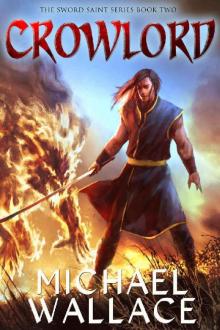 Crowlord (The Sword Saint Series Book 2)
Crowlord (The Sword Saint Series Book 2) Crowlord
Crowlord The Red Sword- The Complete Trilogy
The Red Sword- The Complete Trilogy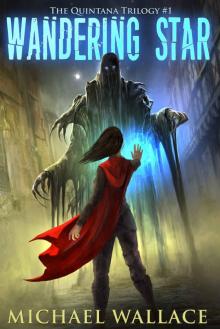 Wandering Star (The Quintana Trilogy Book 1)
Wandering Star (The Quintana Trilogy Book 1)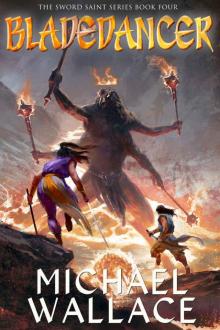 Bladedancer
Bladedancer Sword Saint
Sword Saint The Alliance Trilogy
The Alliance Trilogy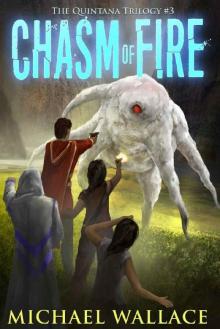 Chasm of Fire
Chasm of Fire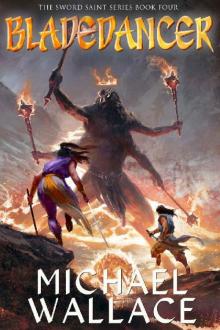 Bladedancer (The Sword Saint Series Book 4)
Bladedancer (The Sword Saint Series Book 4) The Devil's Deep
The Devil's Deep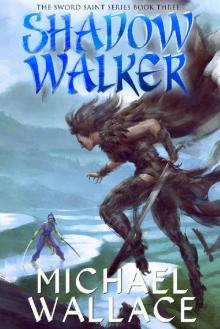 Shadow Walker (The Sword Saint Series Book 3)
Shadow Walker (The Sword Saint Series Book 3) Starship Blackbeard
Starship Blackbeard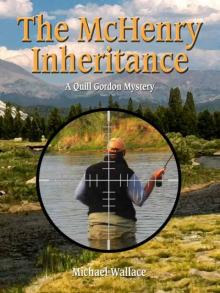 The McHenry Inheritance (Quill Gordon Mystery Book 1)
The McHenry Inheritance (Quill Gordon Mystery Book 1) Sun King (The Void Queen Trilogy Book 3)
Sun King (The Void Queen Trilogy Book 3)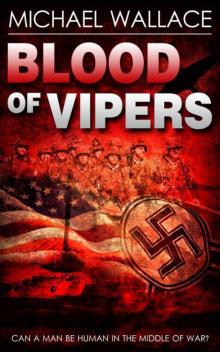 Blood of Vipers
Blood of Vipers Righteous - 01 - The Righteous
Righteous - 01 - The Righteous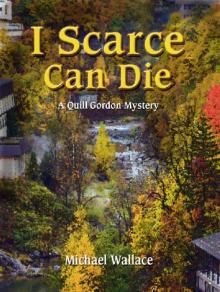 I Scarce Can Die (Quill Gordon Mystery Book 5)
I Scarce Can Die (Quill Gordon Mystery Book 5) The Devil's Cauldron
The Devil's Cauldron The Wicked (The Righteous)
The Wicked (The Righteous) Crow Hollow
Crow Hollow Righteous03 - The Wicked
Righteous03 - The Wicked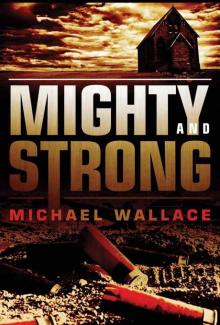 Righteous02 - Mighty and Strong
Righteous02 - Mighty and Strong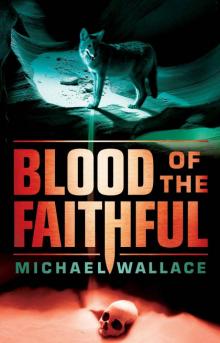 Blood of the Faithful
Blood of the Faithful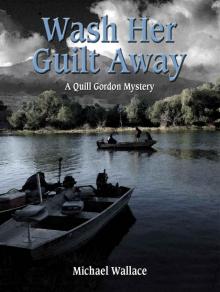 Wash Her Guilt Away (Quill Gordon Mystery Book 2)
Wash Her Guilt Away (Quill Gordon Mystery Book 2) The Kingdom of the Bears
The Kingdom of the Bears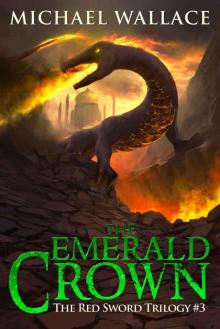 The Emerald Crown (The Red Sword Trilogy Book 3)
The Emerald Crown (The Red Sword Trilogy Book 3)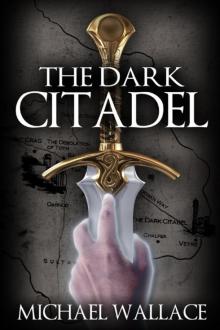 The Dark Citadel
The Dark Citadel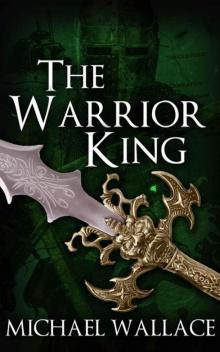 The Warrior King (Book 4)
The Warrior King (Book 4) Rebellion of Stars (Starship Blackbeard Book 4)
Rebellion of Stars (Starship Blackbeard Book 4)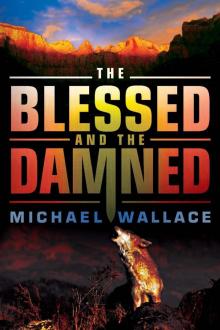 Righteous04 - The Blessed and the Damned
Righteous04 - The Blessed and the Damned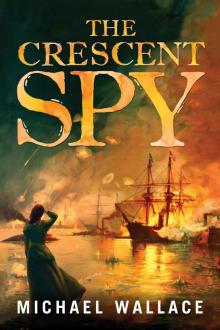 The Crescent Spy
The Crescent Spy Queen of the Void (The Void Queen Trilogy Book 1)
Queen of the Void (The Void Queen Trilogy Book 1)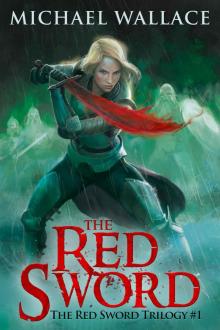 The Red Sword (The Red Sword Trilogy Book 1)
The Red Sword (The Red Sword Trilogy Book 1) The Sentinel (The Sentinel Trilogy Book 1)
The Sentinel (The Sentinel Trilogy Book 1) The Golden Griffin (Book 3)
The Golden Griffin (Book 3)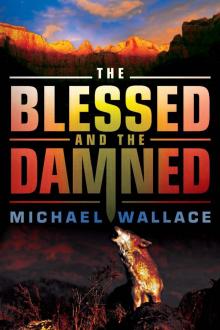 The Blessed and the Damned (Righteous Series #4)
The Blessed and the Damned (Righteous Series #4)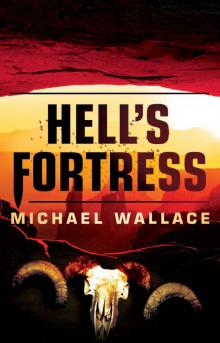 Hell's Fortress
Hell's Fortress Not Death, But Love (Quill Gordon Mystery Book 3)
Not Death, But Love (Quill Gordon Mystery Book 3) Destroying Angel
Destroying Angel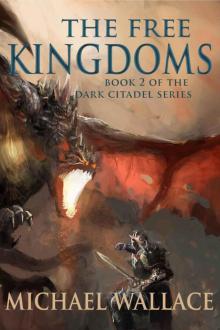 The Free Kingdoms (Book 2)
The Free Kingdoms (Book 2) Dragon Quadrant (The Sentinel Trilogy Book 2)
Dragon Quadrant (The Sentinel Trilogy Book 2) Shattered Sun (The Sentinel Trilogy Book 3)
Shattered Sun (The Sentinel Trilogy Book 3)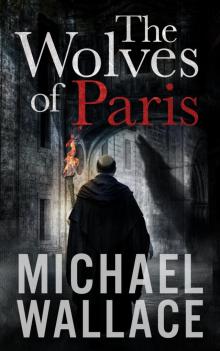 The Wolves of Paris
The Wolves of Paris Lords of Space (Starship Blackbeard Book 2)
Lords of Space (Starship Blackbeard Book 2) Dreadnought (Starship Blackbeard Book 3)
Dreadnought (Starship Blackbeard Book 3)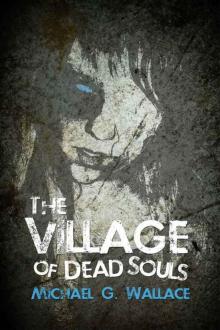 The Village of Dead Souls: A Zombie Novel
The Village of Dead Souls: A Zombie Novel The Black Shield (The Red Sword Book 2)
The Black Shield (The Red Sword Book 2) The Daughters Of Alta Mira (Quill Gordon Mystery Book 4)
The Daughters Of Alta Mira (Quill Gordon Mystery Book 4) Mighty and Strong (The Righteous)
Mighty and Strong (The Righteous)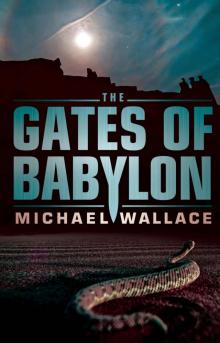 The Gates of Babylon
The Gates of Babylon